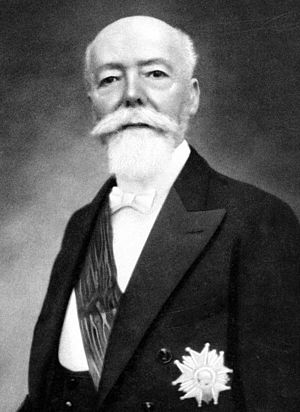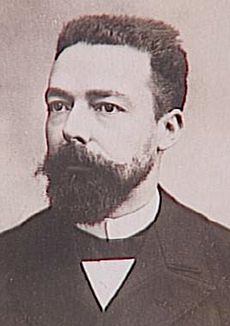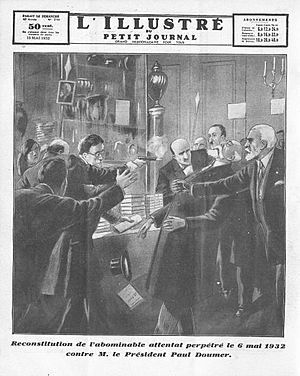Paul Doumer facts for kids
Quick facts for kids
Paul Doumer
|
|
|---|---|

Doumer in 1931
|
|
| President of France | |
| In office 13 June 1931 – 7 May 1932 |
|
| Prime Minister | Pierre Laval André Tardieu |
| Preceded by | Gaston Doumergue |
| Succeeded by | Albert Lebrun |
| President of the Senate | |
| In office 14 January 1927 – 9 June 1931 |
|
| Preceded by | Justin de Selves |
| Succeeded by | Albert Lebrun |
| Minister of Finance | |
| In office 16 December 1925 – 9 March 1926 |
|
| Prime Minister | Aristide Briand |
| Preceded by | Louis Loucheur |
| Succeeded by | Raoul Péret |
| In office 16 January 1921 – 15 January 1922 |
|
| Prime Minister | Aristide Briand |
| Preceded by | Frédéric François-Marsal |
| Succeeded by | Charles de Lasteyrie |
| In office 1 November 1895 – 29 April 1896 |
|
| Prime Minister | Léon Bourgeois |
| Preceded by | Alexandre Ribot |
| Succeeded by | Georges Cochery |
| President of the Chamber of Deputies | |
| In office 10 January 1905 – 31 May 1906 |
|
| Preceded by | Henri Brisson |
| Succeeded by | Henri Brisson |
| Governor-General of French Indochina | |
| In office 13 February 1897 – 14 March 1902 |
|
| Preceded by | Armand Rousseau |
| Succeeded by | Paul Beau |
| Personal details | |
| Born | 22 March 1857 Aurillac, France |
| Died | 7 May 1932 (aged 75) Paris, France |
| Political party | Independent |
| Alma mater | University of Paris |
| Signature |  |
Joseph Athanase Doumer, known as Paul Doumer, was a French politician. He served as President of France from June 13, 1931, until he was assassinated on May 7, 1932.
Contents
Paul Doumer's Early Life
Paul Doumer was born on March 22, 1857, in Aurillac, France. His family did not have much money. He studied at the Conservatoire National des Arts et Métiers. In 1877, he became a math teacher in Mende.
In 1878, Doumer married Blanche Richel. They had eight children together. Sadly, four of his sons died during World War I.
Paul Doumer's Political Career
From 1879 to 1883, Doumer taught in Remiremont. After that, he became the main editor for a French newspaper called Courrier de l'Aisne.

Doumer started his political journey in 1885. He worked for Charles Floquet, who was the head of the Chamber of Deputies. This job is similar to the speaker of a parliament. In 1888, Doumer was elected as a representative for the Aisne area. He later became a Minister of Finance of France (1895–1896). In this role, he tried to introduce an income tax, but it did not pass.
Governor-General of French Indochina
Paul Doumer became the Governor-General of French Indochina from 1897 to 1902. This area included modern-day Vietnam, Cambodia, and Laos. When he arrived, the colonies were losing a lot of money. Doumer wanted to make them profitable. He introduced taxes and worked to make Indochina a place where France could sell its products and French businesses could invest.
Doumer also focused on building modern structures in Indochina, especially in Hanoi, the capital city. Many French-style buildings and tree-lined streets were built during his time. Important projects included the Long Bien Bridge and the Grand Palais. The bridge was even named after him at first. It is still a famous landmark today.
Doumer also helped get approval for the Indochina-Yunnan railway in 1898. This railway was planned to connect French Indochina with southern China.
Return to French Politics
After returning to France, Doumer continued his political career. He was elected to the Chamber of Deputies again. He served as the President of the Chamber from 1902 to 1905.
Doumer became the Minister of Finance of France again in 1925. Later, he served as the President of the French Senate from 1927 until 1931. On May 13, 1931, he was elected President of the French Republic. He won against Aristide Briand and took over from Gaston Doumergue.
Paul Doumer's Assassination
On May 6, 1932, Paul Doumer was at a book fair in Paris. He was talking to an author named Claude Farrère. Suddenly, a man named Paul Gorguloff, who was from Russia, fired several shots. Claude Farrère bravely struggled with the attacker until the police arrived.
Doumer was quickly taken to a hospital in Paris. He passed away early the next morning, on May 7. He is the only French president to have died from a gunshot wound while in office. Gorguloff was found guilty of murder and was executed a few months later.
The writer André Maurois saw the assassination happen. He later wrote about it in his book. Because the president was killed at a meeting of writers, many writers, including Maurois, stood guard over his body at the Élysée Palace.
Paul Doumer's Writings
Paul Doumer also wrote books. Some of his well-known works include L'Indo-Chine française (1904) and Le Livre de mes fils (1906).
See also
 In Spanish: Paul Doumer para niños
In Spanish: Paul Doumer para niños
- List of Finance Ministers of France
- Politics of France
Images for kids
 | Janet Taylor Pickett |
 | Synthia Saint James |
 | Howardena Pindell |
 | Faith Ringgold |



